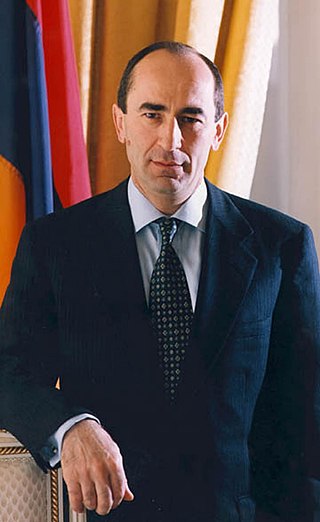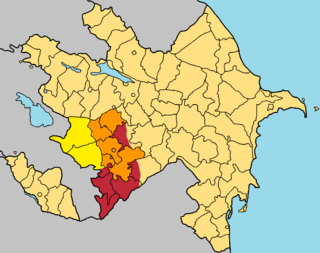This article needs additional citations for verification .(September 2014) |
| |||||
| Decades: | |||||
|---|---|---|---|---|---|
| See also: | Other events of 2014 List of years in Armenia | ||||
The following lists events that happened during 2014 in Armenia .
This article needs additional citations for verification .(September 2014) |
| |||||
| Decades: | |||||
|---|---|---|---|---|---|
| See also: | Other events of 2014 List of years in Armenia | ||||
The following lists events that happened during 2014 in Armenia .

Robert Sedraki Kocharyan is an Armenian politician. He served as the President of the Nagorno-Karabakh Republic from 1994 to 1997 and Prime Minister of Nagorno-Karabakh from 1992 to 1994. He served as the second President of Armenia between 1998 and 2008 and as Prime Minister of Armenia from 1997 to 1998.
The OSCE Minsk Group was created in 1992 by the Conference on Security and Cooperation in Europe (CSCE), now Organization for Security and Co-operation in Europe (OSCE), to encourage a peaceful, negotiated resolution to the conflict between Azerbaijan and Armenia over Nagorno-Karabakh.

The Nagorno-Karabakh conflict is an ethnic and territorial conflict between Armenia and Azerbaijan over the region of Nagorno-Karabakh, inhabited mostly by ethnic Armenians until 2023, and seven surrounding districts, inhabited mostly by Azerbaijanis until their expulsion during the 1990s. The Nagorno-Karabakh region was entirely claimed by and partially controlled by the breakaway Republic of Artsakh, but was recognized internationally as part of Azerbaijan. Azerbaijan gradually re-established control over Nagorno-Karabakh region and the seven surrounding districts.

Serzh Azati Sargsyan is an Armenian politician who served as the third President of Armenia from 2008 to 2018, and twice as the Prime Minister of Armenia from 2007 to 2008 and again from 17 to 23 April 2018, when he was forced to resign in the 2018 Armenian revolution.

United Armenia, also known as Greater Armenia or Great Armenia, is an Armenian ethno-nationalist irredentist concept referring to areas within the traditional Armenian homeland—the Armenian Highland—which are currently or have historically been mostly populated by Armenians. The idea of what Armenians see as unification of their historical lands was prevalent throughout the 20th century and has been advocated by individuals, various organizations and institutions, including the nationalist parties Armenian Revolutionary Federation and Heritage, the ASALA and others.

Nikol Vovayi Pashinyan is an Armenian politician serving as the prime minister of Armenia since 8 May 2018. A journalist by profession, Pashinyan founded his own newspaper in 1998, which was shut down a year later for libel. He was sentenced for one year for defamation against then Minister of National Security Serzh Sargsyan. He edited the newspaper Haykakan Zhamanak from 1999 to 2012. A supporter of Armenia's first president Levon Ter-Petrosyan, he was highly critical of second president Robert Kocharyan, Defense Minister Serzh Sargsyan, and their allies. Pashinyan was also critical of Armenia's close relations with Russia, and promoted establishing closer relations with Turkey instead. He led a minor opposition party in the 2007 parliamentary election, garnering 1.3% of the vote.

Bilateral relations exist between Armenia and Serbia. Diplomatic relations between Armenia and the Federal Republic of Yugoslavia were established on 14 January 1993; Serbia is the legal successor to this country. Both countries are represented through their respective embassies and both have established honorary consulates, which serve as diplomatic representatives between the two countries.

Ilham Heydar oghlu Aliyev is an Azerbaijani politician who is the fourth and current president of Azerbaijan. The son and second child of former Azerbaijani president Heydar Aliyev, Aliyev became the country's president on 31 October 2003, after a two-month term as prime minister of Azerbaijan, through a presidential election defined by irregularities shortly before his father's death. He was reelected for a second term in 2008 and was allowed to run in elections indefinitely in 2013, 2018 and 2024 due to the 2009 constitutional referendum, which removed term limits for presidents. Throughout his electoral campaign, Aliyev was a member of the ruling New Azerbaijan Party, which he has headed since 2005.
The 2010 Mardakert clashes were a series of violations of the First Nagorno-Karabakh War ceasefire. They took place across the line of contact dividing Azerbaijan and the ethnic Armenian military forces of the unrecognized but de facto independent Nagorno-Karabakh Republic. Both sides accused the other of violating the ceasefire regime. These were the worst violations of the cease fire in two years and left Armenian forces with the heaviest casualties since the Mardakert clashes of March 2008.

The Madrid Principles were proposed peace settlements of the Nagorno-Karabakh conflict, proposed by the OSCE Minsk Group. The OSCE Minsk Group was the only internationally agreed body to mediate the negotiations for the peaceful resolution of the conflict prior to the renewed outbreak of hostilities in 2020. Senior Armenian and Azerbaijani officials had agreed on some of the proposed principles but made little or no progress towards the withdrawal of Armenian forces from occupied territories or towards the modalities of the decision on the future Nagorno-Karabakh status.

Armenian–Syrian relations are foreign relations between Armenia and Syria. Armenia has an embassy in Damascus and a consulate general in Aleppo. In 1997, Syria opened an embassy in Yerevan. Syrian Foreign Minister Farouk al-Sharaa visited Armenia in March 1992.

The political status of Nagorno-Karabakh remained unresolved from its declaration of independence on 10 December 1991 to its September 2023 collapse. During Soviet times, it had been an ethnic Armenian autonomous oblast of the Azerbaijan Soviet Socialist Republic. Following the dissolution of the Soviet Union, a conflict arose between local Armenians who sought to have Nagorno-Karabakh join Armenia and local Azerbaijanis who opposed this.
Anti-Armenian sentiment or Armenophobia is widespread in Azerbaijan, mainly due to the conflict over Nagorno-Karabakh. According to the European Commission against Racism and Intolerance (ECRI), Armenians are "the most vulnerable group in Azerbaijan in the field of racism and racial discrimination." A 2012 opinion poll found that 91% of Azerbaijanis perceive Armenia as "the biggest enemy of Azerbaijan." The word "Armenian" (erməni) is widely used as an insult in Azerbaijan. Stereotypical opinions circulating in the mass media have their deep roots in the public consciousness.
The following lists events that happened during 2014 in the Republic of Azerbaijan.
The following lists events that happened during 2010 in Armenia.

The Zurich Protocols refer to two bilateral protocols signed in 2009 by Armenia and Turkey that envisioned starting the process of normalizing relations between the two countries. The Protocols included provisions for the establishment of formal diplomatic relations, the opening of the Turkish-Armenian border, and the establishment of a joint historical commission on the Armenian genocide issue. The agreement, which later proved to be ineffectual, had been brokered by the United States, Russia and France.

The 2016 Nagorno-Karabakh conflict, also known as the Four-Day War, April War, or April clashes, began along the former Nagorno-Karabakh line of contact on 1 April 2016 with the Artsakh Defence Army, backed by the Armenian Armed Forces, on one side and the Azerbaijani Armed Forces on the other.

The Second Nagorno-Karabakh War was an armed conflict in 2020 that took place in the disputed region of Nagorno-Karabakh and the surrounding occupied territories. It was a major escalation of an unresolved conflict over the region, involving Azerbaijan, Armenia and the self-declared Armenian breakaway state of Artsakh. The war lasted for 44 days and resulted in Azerbaijani victory, with the defeat igniting anti-government protests in Armenia. Post-war skirmishes continued in the region, including substantial clashes in 2022.
During its existence, the Republic of Artsakh and the United States did not have official diplomatic relations as the United States was among the vast majority of countries that did not recognize Artsakh as a sovereign nation and instead recognized the region of Artsakh, or Nagorno-Karabakh, as part of Azerbaijan. Despite no formal relations, the Republic of Artsakh had a representative office in Washington, D.C. since November 1997. It is not known whether the office still functions after the apparent dissolution of Artsakh.